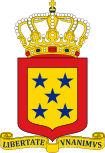First De Jongh-Elhage cabinet | |
|---|---|
| 26th Cabinet of the Netherlands Antilles | |
 | |
| Date formed | 26 March 2006 |
| Date dissolved | 26 March 2010 [1] |
| People and organisations | |
| Head of state | Beatrix of the Netherlands |
| Head of government | Emily de Jongh-Elhage |
| History | |
| Outgoing election | 2010 election |
| Predecessor | Ys II |
| Successor | De Jongh-Elhage II |
 |
|---|
The first De Jongh-Elhage cabinet was the 26th cabinet of the Netherlands Antilles.